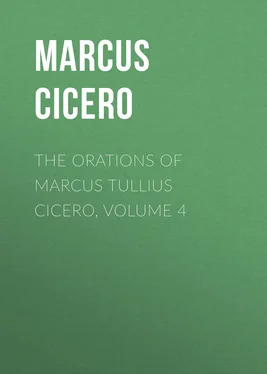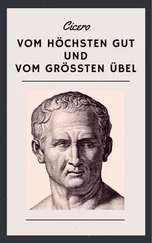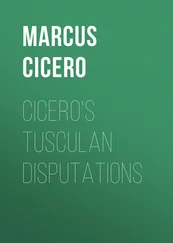Marcus Cicero - The Orations of Marcus Tullius Cicero, Volume 4
Здесь есть возможность читать онлайн «Marcus Cicero - The Orations of Marcus Tullius Cicero, Volume 4» — ознакомительный отрывок электронной книги совершенно бесплатно, а после прочтения отрывка купить полную версию. В некоторых случаях можно слушать аудио, скачать через торрент в формате fb2 и присутствует краткое содержание. Жанр: foreign_antique, Философия, foreign_edu, на английском языке. Описание произведения, (предисловие) а так же отзывы посетителей доступны на портале библиотеки ЛибКат.
- Название:The Orations of Marcus Tullius Cicero, Volume 4
- Автор:
- Жанр:
- Год:неизвестен
- ISBN:нет данных
- Рейтинг книги:3 / 5. Голосов: 1
-
Избранное:Добавить в избранное
- Отзывы:
-
Ваша оценка:
- 60
- 1
- 2
- 3
- 4
- 5
The Orations of Marcus Tullius Cicero, Volume 4: краткое содержание, описание и аннотация
Предлагаем к чтению аннотацию, описание, краткое содержание или предисловие (зависит от того, что написал сам автор книги «The Orations of Marcus Tullius Cicero, Volume 4»). Если вы не нашли необходимую информацию о книге — напишите в комментариях, мы постараемся отыскать её.
The Orations of Marcus Tullius Cicero, Volume 4 — читать онлайн ознакомительный отрывок
Ниже представлен текст книги, разбитый по страницам. Система сохранения места последней прочитанной страницы, позволяет с удобством читать онлайн бесплатно книгу «The Orations of Marcus Tullius Cicero, Volume 4», без необходимости каждый раз заново искать на чём Вы остановились. Поставьте закладку, и сможете в любой момент перейти на страницу, на которой закончили чтение.
Интервал:
Закладка:
XXVII. When, therefore, this fellow had begun to wallow in the treasures of that great man, he began to exult like a buffoon in a play, who has lately been a beggar, and has become suddenly rich. But, as some poet or other says,—
"Ill gotten gain comes quickly to an end."
It is an incredible thing, and almost a miracle, how he in a few, not months, but days, squandered all that vast wealth. There was an immense quantity of wine, an excessive abundance of very valuable plate, much precious apparel, great quantities of splendid furniture, and other magnificent things in many places, such as one was likely to see belonging to a man who was not indeed luxurious, but who was very wealthy. Of all this in a few days there was nothing left. What Charybdis was ever so voracious? Charybdis, do I say? Charybdis, if she existed at all, was only one animal. The ocean, I swear most solemnly, appears scarcely capable of having swallowed up such numbers of things so widely scattered, and distributed in such different places, with such rapidity. Nothing was shut up, nothing sealed up, no list was made of anything. Whole storehouses were abandoned to the most worthless of men. Actors seized on this, actresses on that, the house was crowded with gamblers, and full of drunken men, people were drinking all day, and that too in many places, there were added to all this expense (for this fellow was not invariably fortunate) heavy gambling losses. You might see in the cellars of the slaves, couches covered with the most richly embroidered counterpanes of Cnaeus Pompeius. Wonder not, then, that all these things were so soon consumed. Such profligacy as that could have devoured not only the patrimony of one individual, however ample it might have been, (as indeed his was) but whole cities and kingdoms.
And then his houses and gardens! Oh the cruel audacity! Did you dare to enter into that house? Did you dare to cross that most sacred threshold? and to show your most profligate countenance to the household gods who protect that abode? A house which for a long time no one could behold, no one could pass by without tears! Are you not ashamed to dwell so long in that house? one in which, stupid and ignorant as you are, still you can see nothing which is not painful to you.
XXVIII. When you behold those beaks of ships in the vestibule, and those warlike trophies, do you fancy that you are entering into a house which belongs to you? It is impossible. Although you are devoid of all sense and all feeling,—as in truth you are,—still you are acquainted with yourself, and with your trophies, and with your friends. Nor do I believe that you either waking or sleeping, can ever act with quiet sense. It is impossible but that, were you ever so drunk and frantic,—as in truth you are,—when the recollection of the appearance of that illustrious man comes across you, you should be roused from sleep by your fears, and often stirred up to madness if awake. I pity even the walls and the roof. For what had that house ever beheld except what was modest, except what proceeded from the purest principles and from the most virtuous practice? For that man was, O conscript fathers, as you yourselves know, not only illustrious abroad, but also admirable at home; and not more praiseworthy for his exploits in foreign countries, than for his domestic arrangements. Now in his house every bedchamber is a brothel, and every dining-room a cookshop. Although he denies this:—Do not, do not make inquiries. He is become economical. He desired that mistress of his to take possession of whatever belonged to her, according to the laws of the Twelve Tables. He has taken his keys from her, and turned her out of doors. What a well-tried citizen! of what proved virtue is he! the most honourable passage in whose life is the one when he divorced himself from this actress.
But how constantly does he harp on the expression "the consul Antonius!" This amounts to say "that most debauched consul," "that most worthless of men, the consul." For what else is Antonius? For if any dignity were implied in the name, then, I imagine, your grandfather would sometimes have called himself "the consul Antonius." But he never did. My colleague too, your own uncle, would have called himself so. Unless you are the only Antonius. But I pass over those offences which have no peculiar connexion with the part you took in harassing the republic; I return to that in which you bore so principal a share,—that is, to the civil war; and it is mainly owing to you that that was originated, and brought to a head, and carried on.
XXIX. Though you yourself took no personal share in it, partly through timidity, partly through profligacy, you had tasted, or rather had sucked in, the blood of fellow-citizens: you had been in the battle of Pharsalia as a leader; you had slain Lucius Domitius, a most illustrious and high-born man; you had pursued and put to death in the most barbarous manner many men who had escaped from the battle, and whom Caesar would perhaps have saved, as he did some others.
And after having performed these exploits, what was the reason why you did not follow Caesar into Africa; especially when so large a portion of the war was still remaining? And accordingly, what place did you obtain about Caesar's person after his return from Africa? What was your rank? He whose quaestor you had been when general, whose master of the horse when he was dictator, to whom you had been the chief cause of war, the chief instigator of cruelty, the sharer of his plunder, his son, as you yourself said, by inheritance, proceeded against you for the money which you owed for the house and gardens, and for the other property which you had bought at that sale. At first you answered fiercely enough, and that I may not appear prejudiced against you in every particular, you used a tolerably just and reasonable argument. "What, does Caius Caesar demand money of me? why should he do so, any more than I should claim it of him? Was he victorious without my assistance? No, and he never could have been. It was I who supplied him with a pretext for civil war, it was I who proposed mischievous laws, it was I who took up arms against the consuls and generals of the Roman people, against the senate and people of Rome, against the gods of the country, against its altars and healths, against the country itself. Has he conquered for himself alone? Why should not those men whose common work the achievement is, have the booty also in common?" You were only claiming your right, but what had that to do with it? He was the more powerful of the two.
Therefore, stopping all your expostulations, he sent his soldiers to you, and to your sureties, when all on a sudden out came that splendid catalogue of yours. How men did laugh! That there should be so vast a catalogue, that their should be such a numerous and various list of possessions, of all of which, with the exception of a portion of Misenum, there was nothing which the man who was putting them up to sale could call his own. And what a miserable sight was the auction. A little apparel of Pompeius's, and that stained, a few silver vessels belonging to the same man, all battered, some slaves in wretched condition, so that we grieved that there was anything remaining to be seen of these miserable relics. This auction, however, the heirs of Lucius Rubrius prevented from proceeding, being armed with a decree of Caesar to that effect. The spendthrift was embarrassed. He did not know which way to turn. It was at this very time that an assassin sent by him was said to have been detected with a dagger in the house of Caesar. And of this Caesar himself complained in the senate, inveighing openly against you. Caesar departs to Spain, having granted you a few days delay for making the payment, on account of your poverty. Even then you do not follow him. Had so good a gladiator as you retired from business so early? Can any one then fear a man who was as timid as this man in upholding his party, that is, in upholding his own fortunes?
Читать дальшеИнтервал:
Закладка:
Похожие книги на «The Orations of Marcus Tullius Cicero, Volume 4»
Представляем Вашему вниманию похожие книги на «The Orations of Marcus Tullius Cicero, Volume 4» списком для выбора. Мы отобрали схожую по названию и смыслу литературу в надежде предоставить читателям больше вариантов отыскать новые, интересные, ещё непрочитанные произведения.
Обсуждение, отзывы о книге «The Orations of Marcus Tullius Cicero, Volume 4» и просто собственные мнения читателей. Оставьте ваши комментарии, напишите, что Вы думаете о произведении, его смысле или главных героях. Укажите что конкретно понравилось, а что нет, и почему Вы так считаете.












